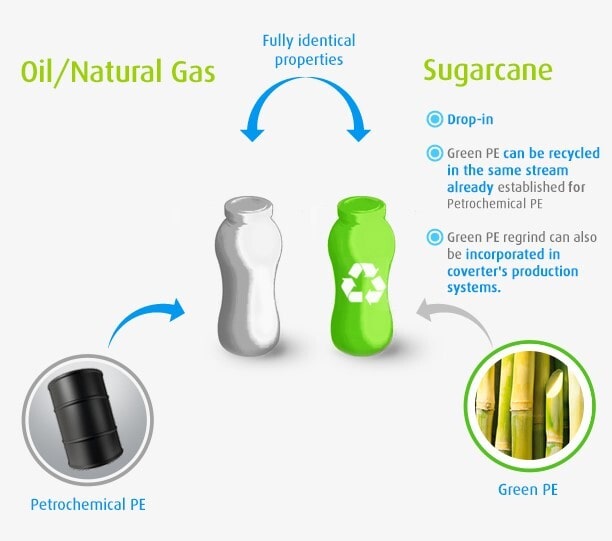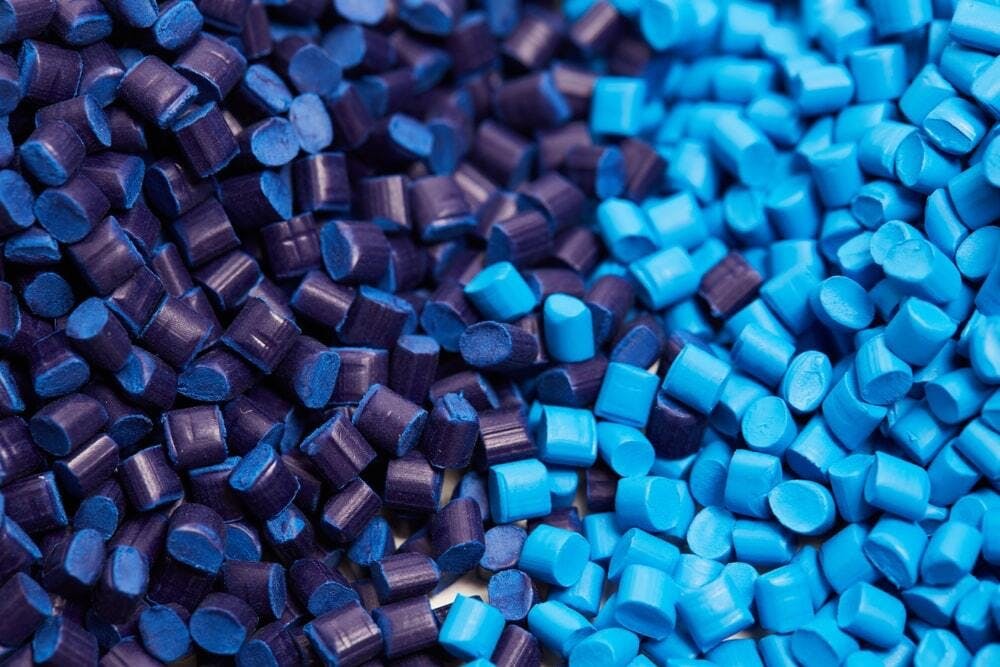Introducing Biobased Polyethylene: 5 Fascinating Facts
As you may know, polyethylene (PE) is an incredibly versatile and widely used plastic that can be found in countless everyday products. From packaging materials and containers to plastic bags and films, PE has become a staple in various industries due to its desirable properties such as durability and flexibility. However, there is a more environmentally friendly alternative to traditional PE known as biobased polyethylene (Bio PE).
These 5 interesting facts about Biobased Polyethylene (Bio PE) you may never known
Facts about Biobased Polyethylene
Renewable origin
Unlike traditional polyethylene, which is derived from fossil fuels, biobased polyethylene uses renewable resources. It can be sourced from various biomaterials such as sugarcane, corn, and algae. Through many processes, the feedstocks undergo transformation and conversion into the polymer known as polyethylene. This biobased polyethylene retains the essential properties of traditional PE while offering a more environmentally friendly alternative. 
By using these environmentally friendly products, humans can have less reliance on fossil fuels and also cut back carbon footprint.
Comparable performance
Biobased polyethylene possesses similar physical and mechanical properties as conventional polyethylene, making it a versatile material for a wide range of applications. It offers excellent strength, flexibility, and durability, making it suitable for packaging, film production, and various other industries.
In detail, biobased polyethylene can be used to create sturdy and reliable containers for food and beverage products in the packing industry. Its strength allows it to withstand the rigors of transportation and handling, ensuring the protection of the packaged goods. Additionally, its flexibility enables the production of packaging materials that can conform to different shapes and sizes, catering to the diverse needs of manufacturers and consumers.
Carbon emission reduction
Its potential to reduce greenhouse gas emissions is one of the most crucial advantages of biobased polyethylene. When produced by biobased polyethylene, it generates fewer carbon emissions than PE. This reduction contributes to achieving net zero global targets.
Statistics show that the production of biobased polyethylene results in approximately 50-70% lower greenhouse gas emissions compared to conventional polyethylene derived from fossil fuels (source: European Bioplastics)
Circular economy contribution
Biobased Polyethylene plays a vital role in advancing the principles of a circular economy by facilitating efficient recycling and minimizing waste generation.
Biobased Polyethylene has the unique characteristic of being compatible with conventional PE during the recycling process. It can be mixed with traditional PE, the material contributes to the circularity of plastic production. It ensures that biobased polyethylene, along with conventional PE, can be transformed into recycled plastic products or used as feedstock for new plastic production.
This closed-loop approach reduces the demand for virgin plastics and promotes the efficient use of resources. By embracing biobased polyethylene and incorporating it into the recycling stream, industries can contribute to a more circular and sustainable plastic economy
Consumer demand adaption
In recent years, consumers have become more environmentally conscious and are actively seeking products that align with their values. Biobased polyethylene has emerged as a compelling solution that meets these consumer expectations. Additionally, they are also seeking accountability from brands regarding their sustainability practices.
AirX introduces a groundbreaking innovation in the world with its Coffee-based polypropylene, which stands as one of the most advanced bioproducts in the market. By harnessing the unique properties of coffee waste, AirX has developed a sustainable alternative to traditional polypropylene.

Using biobased polyethylene not only satisfies consumer demand but also allows businesses to showcase their commitment to sustainability. This trend is expected to continue as consumers increasingly prioritize eco-friendly options.
Another aspect of bio based polypropylene
Another aspect of biobased polypropylene is its potential contribution to reducing plastic waste and addressing the issue of. Microplastics, small plastic particles less than 5mm in size, have become a growing concern due to their negative impact on the environment and ecosystems.
Biobase offers a potential solution to this problem. When biobased polypropylene products reach the end of their life cycle, they can be disposed of through various methods, such as composting or anaerobic digestion. Unlike traditional plastics, bio-based PE has the potential to biodegrade under certain conditions, reducing the long-term presence of plastic waste in the environment.

Additionally, biobased polypropylene has the potential to reduce the release of microplastics during the manufacturing and use phases. Traditional plastic production and usage can lead to the fragmentation and shedding of microplastics, which can contaminate water bodies, and soil, and even enter the food chain. By utilizing bio-based PE, which has the potential to be less prone to microplastic release, we can mitigate the accumulation of these harmful particles in the environment.
However, it's important to note that the specific biodegradability and microplastic release characteristics of bio-based PE can vary depending on the formulation and environmental conditions. Further research and development are needed to optimize these properties and ensure that bio-based polypropylene products provide the desired environmental benefits.
Nonetheless, the potential of biobased polypropylene to reduce plastic waste and minimize microplastic pollution makes it an intriguing alternative in the pursuit of more sustainable and environmentally friendly materials. As advancements in technology and understanding continue, bio-based PE holds promise for addressing the challenges associated with plastic waste and contributing to a cleaner and healthier planet.
Biobased polyethylene represents a promising solution to the environmental challenges posed by traditional plastics. Its renewable origins, comparable performance, reduced carbon emissions, compatibility with existing infrastructure, and recycling capabilities make it an increasingly attractive option for industries striving for sustainability. By embracing bio-based polyethylene, we can contribute to a more sustainable future while minimizing our impact on the planet.
Contact us
AirX coffee, the world’s first carbon-negative bio-materials made from coffee grounds, is a leading company specializing in the production of bio-composite from recycled carbohydrate-derived waste, including coffee grounds, coconut husk, husk, and bamboo. We are dedicated to promoting sustainability through the use of eco-friendly materials in their manufacturing process.
We are always here to help and provide the best service possible. If you have any questions or would like to receive advice and feedback directly from our sales staff, please do not hesitate to contact us. You can reach us through
Whatsapp: +84 969 742 950
Email:[email protected]
We look forward to hearing from you!

